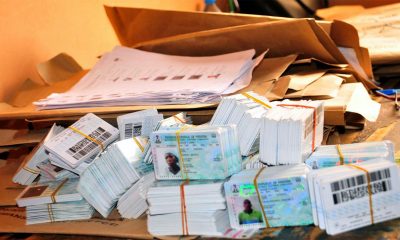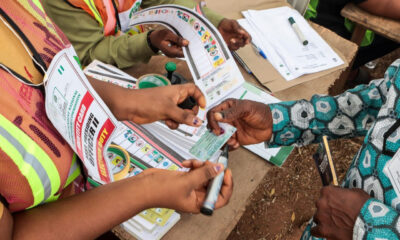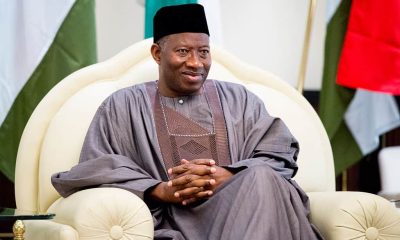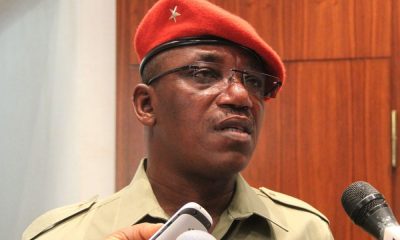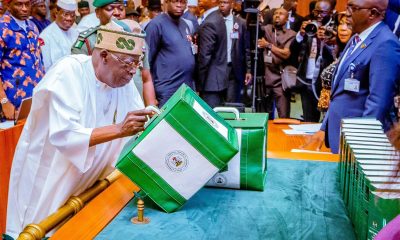Business
N’Assembly approves N14.3tn for debt service out of N45.9tn 2025 budget

N’Assembly approves N14.3tn for debt service out of N45.9tn 2025 budget
The National Assembly on Thursday passed N45.9 trillion as budget for the 2025 fiscal year, setting aside N14.317 trillion for debt servicing.
Both chambers of the assembly agreed to jerk up the budget by N719.5bn over what the executive submitted for approval.
President Bola Tinubu had initially proposed a N49.7 trillion budget but later revised it to N54.2 trillion before seeking legislative approval.
A breakdown of the N14.317 trillion total debt servicing showed that N7.191 trillion is for domestic debts (including Ways and Means), N6.749 trillion is for foreign debts, and N377.299 billion is for sinking funds to retire maturing promissory notes.
Newstrends discovered from a document of the Federal Ministry of Finance that Nigeria’s total debt as of the second quarter of 2024 “grew in naira terms to N134.3 trillion ($91.3 billion) from N121.7 trillion ($91.5 billion) in Q1 2024, driven mainly by exchange rate devaluation.”
Apart from debt service, the approved budget also showed N3.645 trillion for statutory transfers, N13.64 trillion for recurrent expenditure, and N23.963 trillion for capital expenditure (development fund), with a fiscal deficit put at N13.08 trillion.
Under the statutory transfers, National Judicial Council gets N521.626 billion, Niger Delta Development Commission gets N626.533 billion, South East Development Commission gets N140 billion, North West Development Commission gets N145.607 billion, South West Development Commission gets N140 billion, South-South Development Commission gets N140 billion and North Central Development Commission gets N140 billion.
The Universal Basic Education Commission gets N496.842 billion, National Assembly gets N344.853 billion, Public Complaint Commission gets N14.460 billion, Independent National Electoral Commission gets N140 billion, National Human Rights Commission gets N8 billion, North East Development Commission gets N240.988 billion while Basic Health Care Provision Fund gets N298.421 billion, respectively.
From the recurrent (non-debt) expenditure, Presidency gets N111.094 billion, Ministry of Defence gets N2.510 trillion, Ministry of Police Affairs gets N1.226 trillion, Ministry of Interior gets N658.586 billion, National Security Adviser gets N335.975 billion, Ministry of Education gets N1.159 trillion, Ministry of Youths gets N442.271 billion, Ministry of Foreign Affairs gets N286.887 billion, Information and National Orientation gets N75.887 billion, among others.
Under the Capital expenditure, Presidency gets N144.485 billion, Ministry of Defence gets N604.917 billion, National Security Adviser gets N316.864 billion, Secretary to the Government of the Federation gets N155.812 billion, Ministry of Agriculture and Food Security gets N1.201 trillion, Ministry of Finance gets N892.939 billion, Ministry of Works gets N2.045 trillion, Ministry of Water Resources and Sanitation gets N578.398 billion, FCTA gets N229.625 billion, Ministry of Education gets N953.931 billion, Ministry of Health and Social Welfare gets N1.154 trillion, Ministry of Humanitarian Affairs and Poverty Alleviation gets N291.548 billion, among others.
Under the Multilateral/Bilateral loan funded projects, Ministry of Power receives N1.307 trillion; Ministry of Interior, N400.630 billion; Ministry of Communications, Innovation and Digital Economy, N400.630 billion; FCTA N235.369 billion; Ministry of Finance N236.657 billion; Ministry of Agriculture and Food Security, N208.466 billion; Ministry of Education, N193.098 billion; Ministry of Health and Social Welfare gets N56.489 billion, among others.
Business
Dangote urges wealthy Nigerians to invest in industries, not luxury cars, private jets

Dangote urges wealthy Nigerians to invest in industries, not luxury cars, private jets
Africa’s richest man, Aliko Dangote, has called on wealthy Nigerians to redirect funds currently spent on luxury cars and private jets into industrial investments that can generate jobs and foster sustainable economic growth.
In a widely shared interview, the Dangote Group chairman warned that the country’s elite have increasingly prioritized lavish spending over productive ventures. “If you have money to buy a Rolls-Royce, you should take that money and put up an industry in your locality or anywhere there is need,” Dangote said.
He expressed concern over the number of private jets parked at local airports, arguing that the resources tied up in such assets could instead create employment opportunities.
READ ALSO:
- Mohamed Salah Slams Liverpool Boss Arne Slot, Hints at Anfield Exit Ahead of AFCON Departure
- Indonesia Flood Disaster: Death Toll Exceeds 900 as Search for Hundreds Continues
- Russia Intensifies Airstrikes on Ukraine as Zelensky, Trump Envoys Advance Peace Talks
Dangote highlighted Nigeria’s growing population, with an estimated 7.8 million births annually, stressing that both government and private sector actors must invest in infrastructure, power, and productive businesses.
Acknowledging the country’s high taxes, he maintained that businesses must still meet their obligations. “For a company like ours, the tax we pay is too much, but we don’t mind… What we are asking for is an enabling environment, but we too must do our civic duties,” he said.
He also urged Nigerians to prioritize domestic investment over foreign capital, noting that attracting investment depends on good policy and rule of law. “We should stop calling for foreign investors because there’s no foreign investor anywhere. What attracts investment is good policy and rule of law,” Dangote added.
Dangote urges wealthy Nigerians to invest in industries, not luxury cars, private jets
Business
Imo Economic Summit: Aliko Dangote Vows to Become State’s Largest Investor

Imo Economic Summit: Aliko Dangote Vows to Become State’s Largest Investor
OWERRI — Africa’s richest man, Aliko Dangote, has assured Imo State Governor Hope Uzodimma that the Dangote Group is prepared to become one of the biggest investors in Imo State, reaffirming the conglomerate’s commitment to expanding its footprint in Nigeria.
Speaking on Thursday during the opening session of the Imo Economic Summit 2025, Dangote called on the state government to specify key sectors requiring investment, promising immediate action once directives are given.
Dangote, who described Governor Uzodimma as a long-time friend, commended him for fostering an enabling environment for business and economic growth in the state.
READ ALSO:
- NSCDC rejects VIP protection requests from senators as demand surges after police withdrawal
- Edo Assembly Moves to Arrest Obaseki, Others Over MOWAA, Radisson Hotel Probe
- Three Top Contenders to Replace William Troost-Ekong as Super Eagles Captain
“We will be one of your biggest investors in Imo. So please tell me the area to invest and we will invest,” he said.
The African industrialist also encouraged Nigerian entrepreneurs to focus on developing their home regions, stressing that sustainable economic growth cannot depend on foreign capital alone.
“What attracts foreign investors is a domestic investor. Africa has about 30 percent of the world’s minerals. We are blessed,” he noted.
Dangote further highlighted progress at the Dangote Refinery, announcing that the facility is on track to achieve a 1.4 million barrels-per-day production capacity, making it the largest single-train refinery in the world.
The assurance marks a significant boost for Imo State’s investment outlook as the government continues efforts to strengthen its economy and attract large-scale private sector participation.
Imo Economic Summit: Aliko Dangote Vows to Become State’s Largest Investor
Auto
Court of Appeal Affirms Ruling Barring VIO from Seizing Vehicles or Fining Motorists
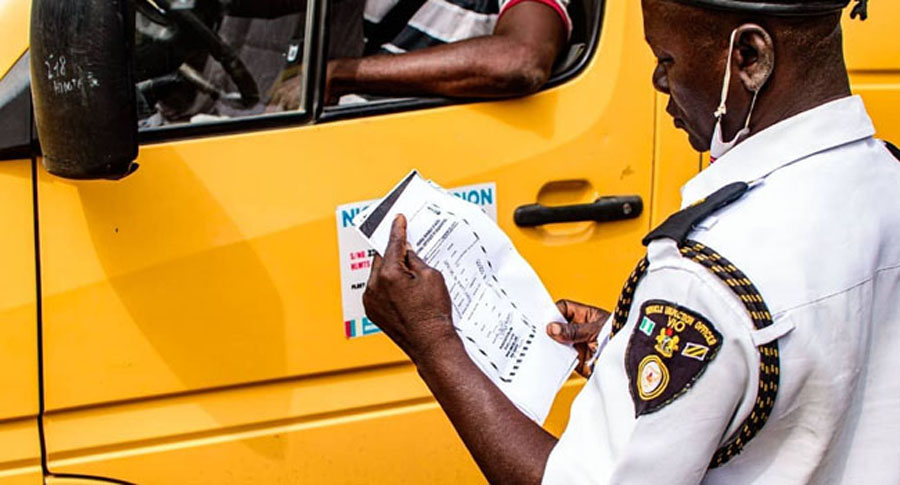
Court of Appeal Affirms Ruling Barring VIO from Seizing Vehicles or Fining Motorists
The Court of Appeal, Abuja, on Thursday, upheld a previous Federal High Court judgment prohibiting the Vehicle Inspection Officers (VIO) and the Directorate of Road Traffic Services (DRTS) from confiscating vehicles or imposing fines on motorists without lawful authority.
A three-member panel of appellate justices, led by Justice Oyejoju Oyewumi, dismissed the appeal filed by the VIO, describing it as lacking merit and affirming the October 16, 2024 ruling of the high court.
The original suit, marked FHC/ABJ/CS/1695/2023, was filed by public interest lawyer Abubakar Marshal, who alleged that he was unlawfully stopped and had his vehicle confiscated by VIO officials at Jabi District, Abuja, on December 12, 2023. He contended that the action was a violation of his fundamental rights.
READ ALSO:
- FG secures release of three Nigerians detained in Saudi Arabia
- Groups Reject Senator’s Call for Removal of NSA Nuhu Ribadu
- US authorities arrest Nigerian CEO Cashmir Chinedu Luke for alleged $7m VA fraud
Justice Nkeonye Maha of the Federal High Court had declared that no law empowers the VIO to stop, seize, impound, or fine motorists, and granted a perpetual injunction restraining the agency and its agents from further violating citizens’ freedom of movement, presumption of innocence, and right to own property.
The court held that only a court of competent jurisdiction can impose fines or sanctions on motorists. It further ruled that the actions of the Respondents violated Section 42 of the 1999 Constitution and relevant articles of the African Charter on Human and Peoples’ Rights.
Although the applicant had sought N500 million in damages and a public apology, the court awarded him N2.5 million. Respondents included the Director of the Directorate of Road Traffic Services, the Abuja Area Commander, the team leader, and the Minister of the Federal Capital Territory.
The appellate court’s decision confirms that the VIO and DRTS cannot legally harass motorists, reinforcing citizens’ constitutional rights on the road.
Court of Appeal Affirms Ruling Barring VIO from Seizing Vehicles or Fining Motorists
-
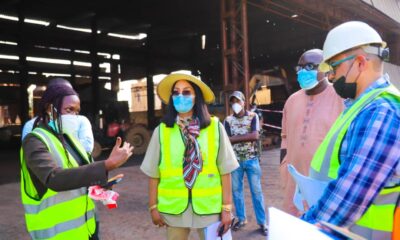
 metro3 days ago
metro3 days agoSenate Launches Emergency Probe into Widespread Lead Poisoning in Ogijo, Lagos/Ogun
-

 Auto3 days ago
Auto3 days agoCourt of Appeal Affirms Ruling Barring VIO from Seizing Vehicles or Fining Motorists
-

 Sports1 day ago
Sports1 day ago2026 FIFA World Cup Draw: England Draw Croatia as Brazil Face Morocco in Tournament Opener
-

 News3 days ago
News3 days agoUS authorities arrest Nigerian CEO Cashmir Chinedu Luke for alleged $7m VA fraud
-

 metro3 days ago
metro3 days agoFG secures release of three Nigerians detained in Saudi Arabia
-

 metro3 days ago
metro3 days agoBuratai Defends Nigeria’s Resilience, Says Nation Is “Rising, Not Failing” Despite Insecurity
-

 News1 day ago
News1 day agoAkpabio sues Natasha for ₦200bn over sexual harassment allegations
-
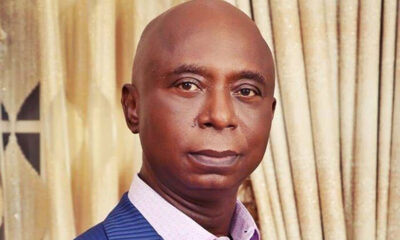
 metro3 days ago
metro3 days agoNed Nwoko vows legal action against rising online harassment, criminal defamation



